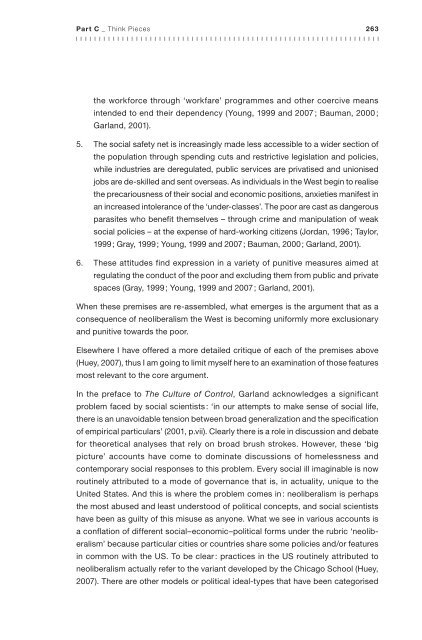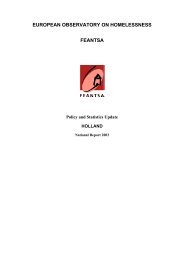- Page 1 and 2:
European Observatory on Homelessnes
- Page 3 and 4:
Contributors Mike Allen Focus Irela
- Page 5 and 6:
Hugh Frazer Department of Applied S
- Page 7 and 8:
International Advisory Committee of
- Page 9 and 10:
Content Policy Evaluation Hannele T
- Page 11:
Foreword René KNEIP, President of
- Page 14 and 15:
14 European Journal of Homelessness
- Page 16 and 17:
16 European Journal of Homelessness
- Page 18 and 19:
18 European Journal of Homelessness
- Page 20 and 21:
20 European Journal of Homelessness
- Page 23 and 24:
Part A _ Articles The Governance of
- Page 25 and 26:
Part A _ Articles antecedents demon
- Page 27 and 28:
Part A _ Articles However, the rela
- Page 29 and 30:
Part A _ Articles different ideolog
- Page 31 and 32:
Part A _ Articles Table 1 : Homeles
- Page 33 and 34:
Part A _ Articles Definition of hom
- Page 35 and 36:
Part A _ Articles stakeholders, the
- Page 37 and 38:
Part A _ Articles the duty of local
- Page 39 and 40:
Part A _ Articles Definition of hom
- Page 41 and 42:
Part A _ Articles health problems c
- Page 43 and 44:
Part A _ Articles Comparing Homeles
- Page 45 and 46:
Part A _ Articles municipal authori
- Page 47 and 48:
Part A _ Articles > > References Am
- Page 49 and 50:
Part A _ Articles Hudson, J. and Ku
- Page 51:
Part A _ Articles Walsh, T. (2003)
- Page 54 and 55:
54 European Journal of Homelessness
- Page 56 and 57:
56 European Journal of Homelessness
- Page 58 and 59:
58 European Journal of Homelessness
- Page 60 and 61:
60 European Journal of Homelessness
- Page 62 and 63:
62 European Journal of Homelessness
- Page 64 and 65:
64 European Journal of Homelessness
- Page 66 and 67:
66 European Journal of Homelessness
- Page 68 and 69:
68 European Journal of Homelessness
- Page 70 and 71:
70 European Journal of Homelessness
- Page 72 and 73:
72 European Journal of Homelessness
- Page 74 and 75:
74 European Journal of Homelessness
- Page 76 and 77:
76 European Journal of Homelessness
- Page 78 and 79:
78 European Journal of Homelessness
- Page 80 and 81:
80 European Journal of Homelessness
- Page 82 and 83:
82 European Journal of Homelessness
- Page 84 and 85:
84 European Journal of Homelessness
- Page 86 and 87:
86 European Journal of Homelessness
- Page 88 and 89:
88 European Journal of Homelessness
- Page 90 and 91:
90 European Journal of Homelessness
- Page 92 and 93:
92 European Journal of Homelessness
- Page 94 and 95:
94 European Journal of Homelessness
- Page 96 and 97:
96 European Journal of Homelessness
- Page 98 and 99:
98 European Journal of Homelessness
- Page 100:
100 European Journal of Homelessnes
- Page 103 and 104:
Part A _ Articles 103 CEE countries
- Page 105 and 106:
Part A _ Articles 105 Hungary’s t
- Page 107 and 108:
Part A _ Articles other areas the r
- Page 109 and 110:
Part A _ Articles 109 The roles and
- Page 111 and 112:
Part A _ Articles coordinating and
- Page 113 and 114:
Part A _ Articles 113 drug users (S
- Page 115 and 116:
Part A _ Articles Table 1 : Actors
- Page 117 and 118:
Part A _ Articles ties carried out
- Page 119 and 120:
Part A _ Articles 119 The role of t
- Page 121 and 122:
Part A _ Articles 121 processes. Ex
- Page 123 and 124:
Part A _ Articles Hacker B. (2009)
- Page 125:
Part A _ Articles State Audit Offic
- Page 128 and 129:
128 European Journal of Homelessnes
- Page 130 and 131:
130 European Journal of Homelessnes
- Page 132 and 133:
132 European Journal of Homelessnes
- Page 134 and 135:
134 European Journal of Homelessnes
- Page 136 and 137:
136 European Journal of Homelessnes
- Page 138 and 139:
138 European Journal of Homelessnes
- Page 140 and 141:
140 European Journal of Homelessnes
- Page 142 and 143:
142 European Journal of Homelessnes
- Page 144 and 145:
144 European Journal of Homelessnes
- Page 146 and 147:
146 European Journal of Homelessnes
- Page 148 and 149:
148 European Journal of Homelessnes
- Page 150 and 151:
150 European Journal of Homelessnes
- Page 152 and 153:
152 European Journal of Homelessnes
- Page 155 and 156:
Part A _ Articles How Urban Plannin
- Page 157 and 158:
Part A _ Articles • • 157 guara
- Page 159 and 160:
Part A _ Articles Mandič, 2006). I
- Page 161 and 162:
Part A _ Articles 161 It can be man
- Page 163 and 164:
Part A _ Articles Inclusionary Hous
- Page 165 and 166:
Part A _ Articles 165 Another parti
- Page 167 and 168:
Part A _ Articles Limitations and C
- Page 169 and 170:
Part A _ Articles • 169 when they
- Page 171 and 172:
Part A _ Articles > > References Ak
- Page 173 and 174:
Part A _ Articles Crook, T. and Whi
- Page 175 and 176:
Part A _ Articles McIlwain, J. (200
- Page 177:
Part A _ Articles Wheeler, S. (1998
- Page 181 and 182:
Part B _ Evaluation The Finnish Hom
- Page 183 and 184:
Part B _ Evaluation 183 measures ar
- Page 185 and 186:
Part B _ Evaluation 185 The sector
- Page 187 and 188:
Part B _ Evaluation 187 Conventiona
- Page 189 and 190:
Part B _ Evaluation Extending and d
- Page 191 and 192:
Part B _ Evaluation 191 Furthermore
- Page 193 and 194:
Part B _ Evaluation Conclusion This
- Page 195 and 196:
Part B _ Evaluation Karjalainen, J.
- Page 197 and 198:
Part B _ Evaluation > > Appendix Pr
- Page 199:
Part B _ Evaluation 8. accommodatio
- Page 202 and 203:
202 European Journal of Homelessnes
- Page 204 and 205:
204 European Journal of Homelessnes
- Page 206 and 207:
206 European Journal of Homelessnes
- Page 208 and 209:
208 European Journal of Homelessnes
- Page 210 and 211:
210 European Journal of Homelessnes
- Page 212 and 213: 212 European Journal of Homelessnes
- Page 214 and 215: 214 European Journal of Homelessnes
- Page 216 and 217: 216 European Journal of Homelessnes
- Page 218 and 219: 218 European Journal of Homelessnes
- Page 220 and 221: 220 European Journal of Homelessnes
- Page 222 and 223: 222 European Journal of Homelessnes
- Page 224 and 225: 224 European Journal of Homelessnes
- Page 226 and 227: 226 European Journal of Homelessnes
- Page 228 and 229: 228 European Journal of Homelessnes
- Page 230 and 231: 230 European Journal of Homelessnes
- Page 232 and 233: 232 European Journal of Homelessnes
- Page 234 and 235: 234 European Journal of Homelessnes
- Page 236 and 237: 236 European Journal of Homelessnes
- Page 238 and 239: 238 European Journal of Homelessnes
- Page 240 and 241: 240 European Journal of Homelessnes
- Page 242 and 243: 242 European Journal of Homelessnes
- Page 245: Part C 245 Think Pieces
- Page 248 and 249: 248 European Journal of Homelessnes
- Page 250 and 251: 250 European Journal of Homelessnes
- Page 252 and 253: 252 European Journal of Homelessnes
- Page 254 and 255: 254 European Journal of Homelessnes
- Page 256 and 257: 256 European Journal of Homelessnes
- Page 258 and 259: 258 European Journal of Homelessnes
- Page 260 and 261: 260 European Journal of Homelessnes
- Page 264 and 265: 264 European Journal of Homelessnes
- Page 266 and 267: 266 European Journal of Homelessnes
- Page 268 and 269: 268 European Journal of Homelessnes
- Page 270 and 271: 270 European Journal of Homelessnes
- Page 272 and 273: 272 European Journal of Homelessnes
- Page 275 and 276: Part C _ Think Pieces Speaking for
- Page 277 and 278: Part C _ Think Pieces 277 construct
- Page 279 and 280: Part C _ Think Pieces 279 stay at h
- Page 281 and 282: Part C _ Think Pieces 281 Afterward
- Page 283 and 284: Part C _ Think Pieces 283 Second, t
- Page 285 and 286: Part C _ Think Pieces Programmes of
- Page 287 and 288: Part C _ Think Pieces > > Reference
- Page 289 and 290: Part C _ Think Pieces The Political
- Page 291 and 292: Part C _ Think Pieces 291 tion and
- Page 293 and 294: Part C _ Think Pieces Transience 29
- Page 295 and 296: Part C _ Think Pieces 295 successfu
- Page 297 and 298: Part C _ Think Pieces 297 ties from
- Page 299: Part C _ Think Pieces > > Reference
- Page 302 and 303: 302 European Journal of Homelessnes
- Page 304 and 305: 304 European Journal of Homelessnes
- Page 306 and 307: 306 European Journal of Homelessnes
- Page 308 and 309: 308 European Journal of Homelessnes
- Page 310 and 311: 310 European Journal of Homelessnes
- Page 312 and 313:
312 European Journal of Homelessnes
- Page 314 and 315:
314 European Journal of Homelessnes
- Page 316 and 317:
316 European Journal of Homelessnes
- Page 318 and 319:
318 European Journal of Homelessnes
- Page 320 and 321:
320 European Journal of Homelessnes
- Page 322 and 323:
322 European Journal of Homelessnes
- Page 324 and 325:
324 European Journal of Homelessnes
- Page 326 and 327:
326 European Journal of Homelessnes
- Page 329:
Part D 329 Reviews
- Page 332 and 333:
332 European Journal of Homelessnes
- Page 335 and 336:
Part D _ Reviews Bundesarbeitsgemei
- Page 337 and 338:
Part D _ Reviews 337 The age groups
- Page 339 and 340:
Part D _ Reviews Paula Mayock, Mary
- Page 341:
Part D _ Reviews 341 controlling te
- Page 344 and 345:
344 European Journal of Homelessnes
- Page 346 and 347:
346 European Journal of Homelessnes
- Page 348 and 349:
348 European Journal of Homelessnes
- Page 350 and 351:
350 European Journal of Homelessnes
- Page 352:
FEANTSA is supported by the Europea




